Legal System for Business: Classifications of Law, Source of Law, and UK Law Making Process
VerifiedAdded on 2023/06/07
|9
|2560
|306
AI Summary
This report covers the topics such as classification of laws in terms of civil and criminal law in United Kingdom. It also discusses the sources of law and explains the concept of delegated legislation. Further, it evaluates the law making process in the country focusing on Employment law.
Contribute Materials
Your contribution can guide someone’s learning journey. Share your
documents today.
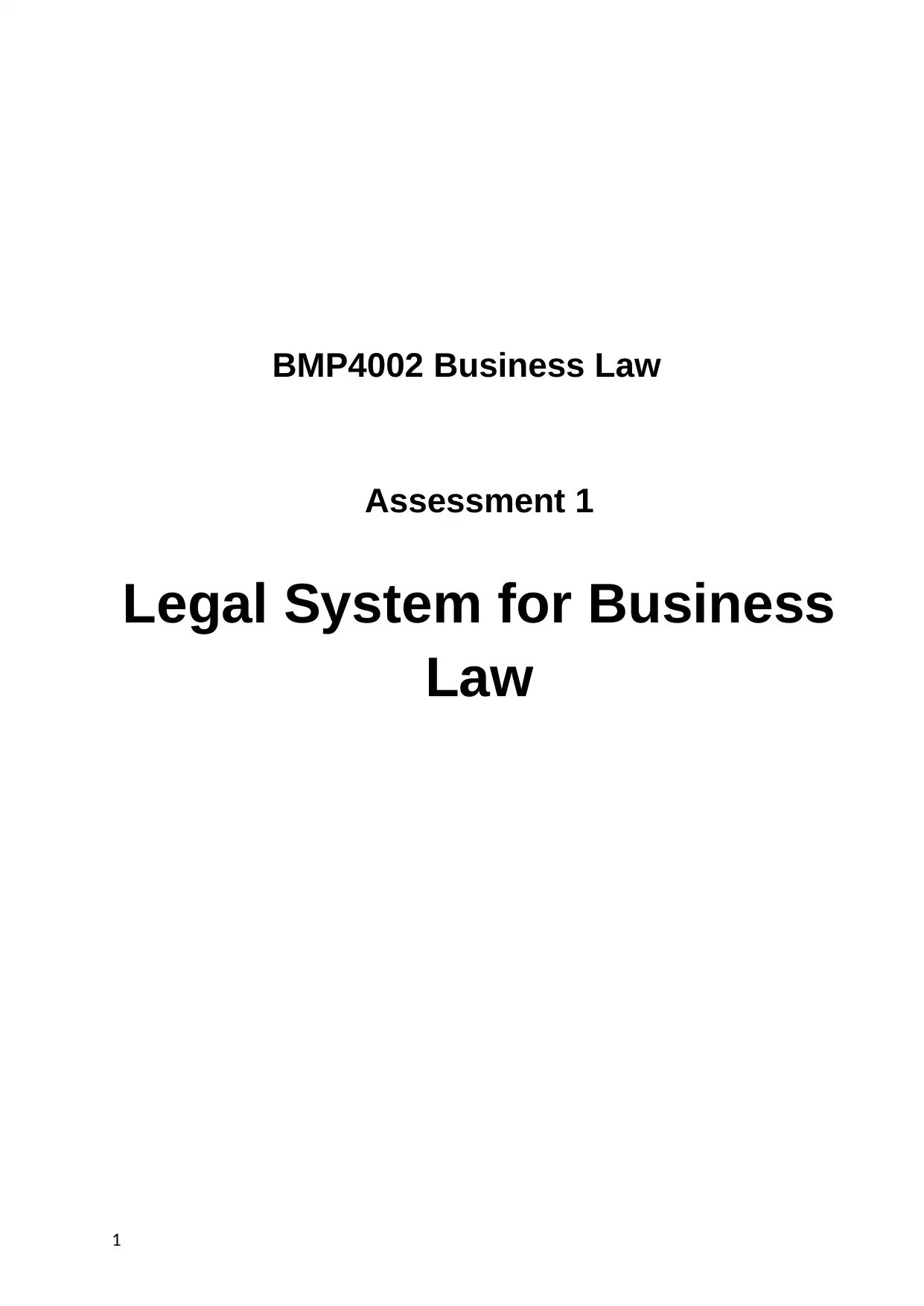
BMP4002 Business Law
Assessment 1
Legal System for Business
Law
1
Assessment 1
Legal System for Business
Law
1
Secure Best Marks with AI Grader
Need help grading? Try our AI Grader for instant feedback on your assignments.
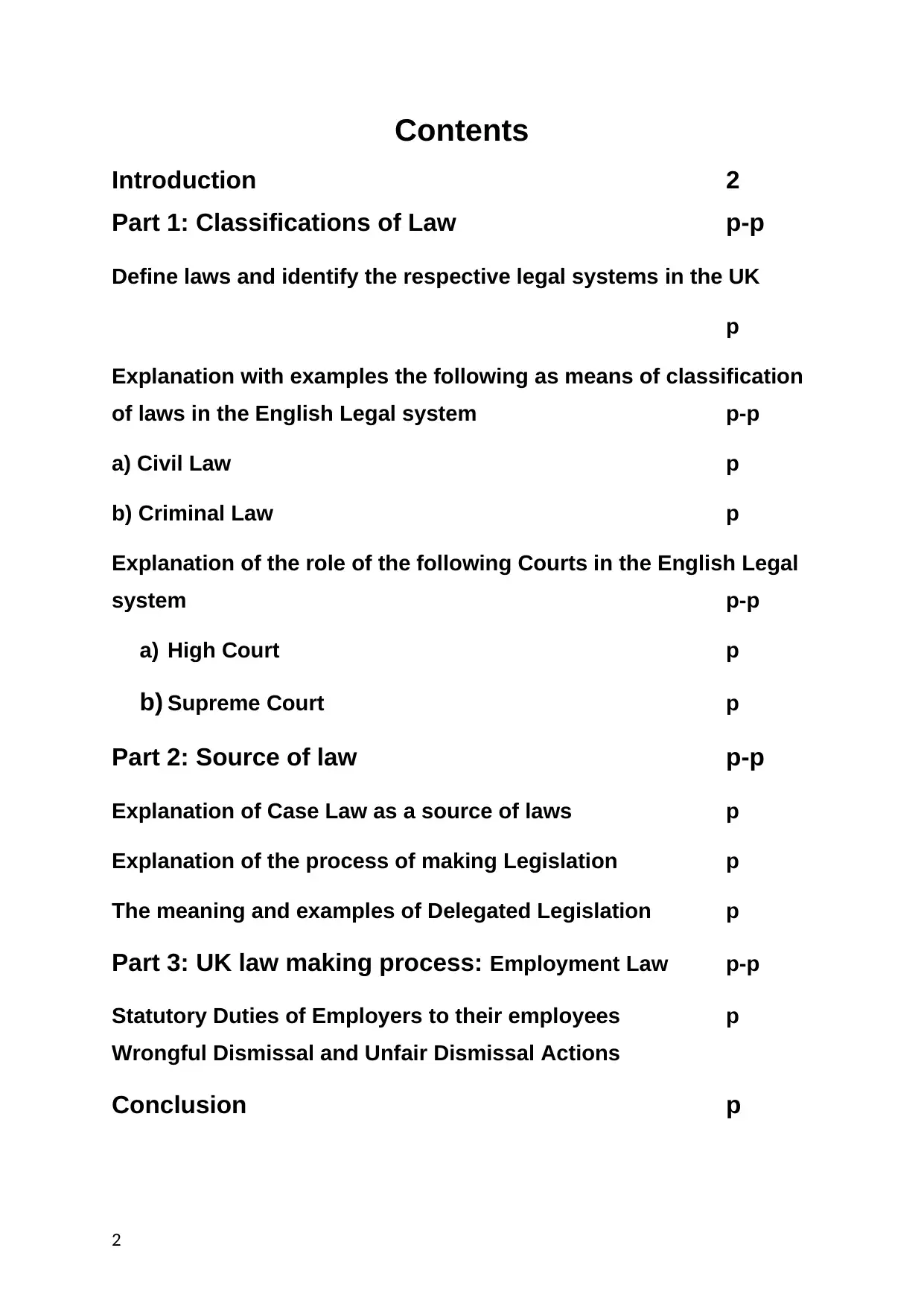
Contents
Introduction 2
Part 1: Classifications of Law p-p
Define laws and identify the respective legal systems in the UK
p
Explanation with examples the following as means of classification
of laws in the English Legal system p-p
a) Civil Law p
b) Criminal Law p
Explanation of the role of the following Courts in the English Legal
system p-p
a) High Court p
b) Supreme Court p
Part 2: Source of law p-p
Explanation of Case Law as a source of laws p
Explanation of the process of making Legislation p
The meaning and examples of Delegated Legislation p
Part 3: UK law making process: Employment Law p-p
Statutory Duties of Employers to their employees p
Wrongful Dismissal and Unfair Dismissal Actions
Conclusion p
2
Introduction 2
Part 1: Classifications of Law p-p
Define laws and identify the respective legal systems in the UK
p
Explanation with examples the following as means of classification
of laws in the English Legal system p-p
a) Civil Law p
b) Criminal Law p
Explanation of the role of the following Courts in the English Legal
system p-p
a) High Court p
b) Supreme Court p
Part 2: Source of law p-p
Explanation of Case Law as a source of laws p
Explanation of the process of making Legislation p
The meaning and examples of Delegated Legislation p
Part 3: UK law making process: Employment Law p-p
Statutory Duties of Employers to their employees p
Wrongful Dismissal and Unfair Dismissal Actions
Conclusion p
2

3
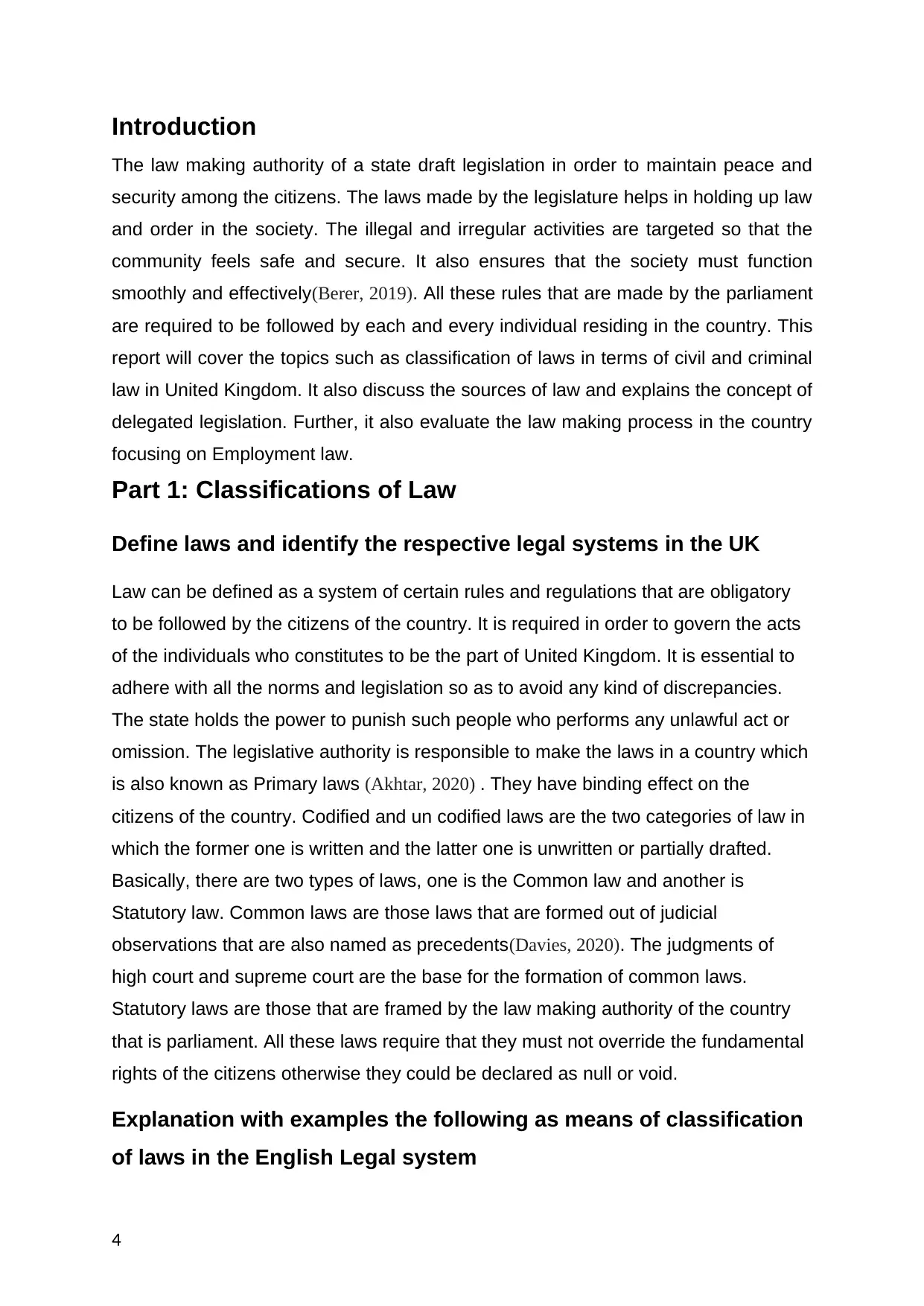
Introduction
The law making authority of a state draft legislation in order to maintain peace and
security among the citizens. The laws made by the legislature helps in holding up law
and order in the society. The illegal and irregular activities are targeted so that the
community feels safe and secure. It also ensures that the society must function
smoothly and effectively(Berer, 2019). All these rules that are made by the parliament
are required to be followed by each and every individual residing in the country. This
report will cover the topics such as classification of laws in terms of civil and criminal
law in United Kingdom. It also discuss the sources of law and explains the concept of
delegated legislation. Further, it also evaluate the law making process in the country
focusing on Employment law.
Part 1: Classifications of Law
Define laws and identify the respective legal systems in the UK
Law can be defined as a system of certain rules and regulations that are obligatory
to be followed by the citizens of the country. It is required in order to govern the acts
of the individuals who constitutes to be the part of United Kingdom. It is essential to
adhere with all the norms and legislation so as to avoid any kind of discrepancies.
The state holds the power to punish such people who performs any unlawful act or
omission. The legislative authority is responsible to make the laws in a country which
is also known as Primary laws (Akhtar, 2020) . They have binding effect on the
citizens of the country. Codified and un codified laws are the two categories of law in
which the former one is written and the latter one is unwritten or partially drafted.
Basically, there are two types of laws, one is the Common law and another is
Statutory law. Common laws are those laws that are formed out of judicial
observations that are also named as precedents(Davies, 2020). The judgments of
high court and supreme court are the base for the formation of common laws.
Statutory laws are those that are framed by the law making authority of the country
that is parliament. All these laws require that they must not override the fundamental
rights of the citizens otherwise they could be declared as null or void.
Explanation with examples the following as means of classification
of laws in the English Legal system
4
The law making authority of a state draft legislation in order to maintain peace and
security among the citizens. The laws made by the legislature helps in holding up law
and order in the society. The illegal and irregular activities are targeted so that the
community feels safe and secure. It also ensures that the society must function
smoothly and effectively(Berer, 2019). All these rules that are made by the parliament
are required to be followed by each and every individual residing in the country. This
report will cover the topics such as classification of laws in terms of civil and criminal
law in United Kingdom. It also discuss the sources of law and explains the concept of
delegated legislation. Further, it also evaluate the law making process in the country
focusing on Employment law.
Part 1: Classifications of Law
Define laws and identify the respective legal systems in the UK
Law can be defined as a system of certain rules and regulations that are obligatory
to be followed by the citizens of the country. It is required in order to govern the acts
of the individuals who constitutes to be the part of United Kingdom. It is essential to
adhere with all the norms and legislation so as to avoid any kind of discrepancies.
The state holds the power to punish such people who performs any unlawful act or
omission. The legislative authority is responsible to make the laws in a country which
is also known as Primary laws (Akhtar, 2020) . They have binding effect on the
citizens of the country. Codified and un codified laws are the two categories of law in
which the former one is written and the latter one is unwritten or partially drafted.
Basically, there are two types of laws, one is the Common law and another is
Statutory law. Common laws are those laws that are formed out of judicial
observations that are also named as precedents(Davies, 2020). The judgments of
high court and supreme court are the base for the formation of common laws.
Statutory laws are those that are framed by the law making authority of the country
that is parliament. All these laws require that they must not override the fundamental
rights of the citizens otherwise they could be declared as null or void.
Explanation with examples the following as means of classification
of laws in the English Legal system
4
Secure Best Marks with AI Grader
Need help grading? Try our AI Grader for instant feedback on your assignments.
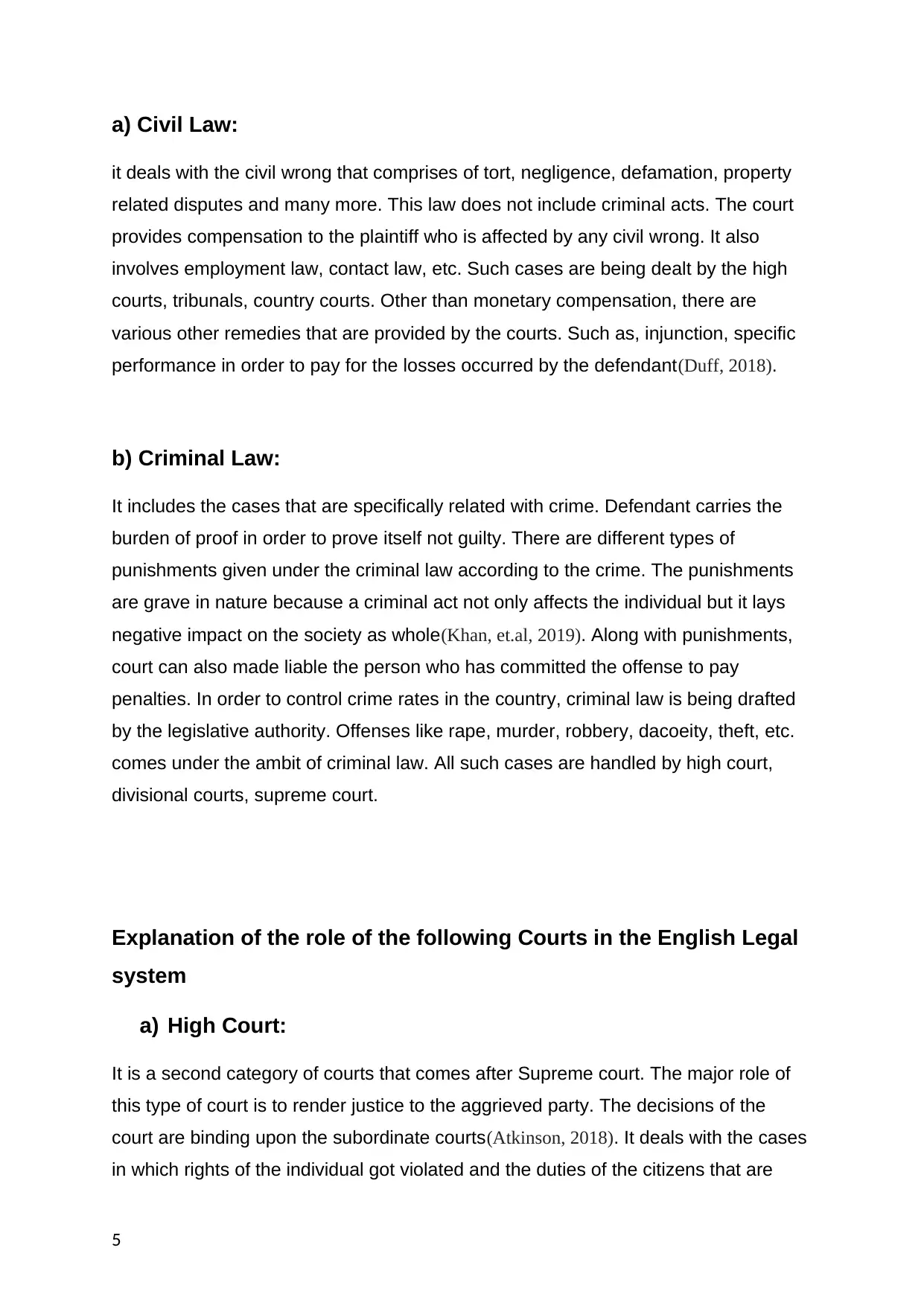
a) Civil Law:
it deals with the civil wrong that comprises of tort, negligence, defamation, property
related disputes and many more. This law does not include criminal acts. The court
provides compensation to the plaintiff who is affected by any civil wrong. It also
involves employment law, contact law, etc. Such cases are being dealt by the high
courts, tribunals, country courts. Other than monetary compensation, there are
various other remedies that are provided by the courts. Such as, injunction, specific
performance in order to pay for the losses occurred by the defendant(Duff, 2018).
b) Criminal Law:
It includes the cases that are specifically related with crime. Defendant carries the
burden of proof in order to prove itself not guilty. There are different types of
punishments given under the criminal law according to the crime. The punishments
are grave in nature because a criminal act not only affects the individual but it lays
negative impact on the society as whole(Khan, et.al, 2019). Along with punishments,
court can also made liable the person who has committed the offense to pay
penalties. In order to control crime rates in the country, criminal law is being drafted
by the legislative authority. Offenses like rape, murder, robbery, dacoeity, theft, etc.
comes under the ambit of criminal law. All such cases are handled by high court,
divisional courts, supreme court.
Explanation of the role of the following Courts in the English Legal
system
a) High Court:
It is a second category of courts that comes after Supreme court. The major role of
this type of court is to render justice to the aggrieved party. The decisions of the
court are binding upon the subordinate courts(Atkinson, 2018). It deals with the cases
in which rights of the individual got violated and the duties of the citizens that are
5
it deals with the civil wrong that comprises of tort, negligence, defamation, property
related disputes and many more. This law does not include criminal acts. The court
provides compensation to the plaintiff who is affected by any civil wrong. It also
involves employment law, contact law, etc. Such cases are being dealt by the high
courts, tribunals, country courts. Other than monetary compensation, there are
various other remedies that are provided by the courts. Such as, injunction, specific
performance in order to pay for the losses occurred by the defendant(Duff, 2018).
b) Criminal Law:
It includes the cases that are specifically related with crime. Defendant carries the
burden of proof in order to prove itself not guilty. There are different types of
punishments given under the criminal law according to the crime. The punishments
are grave in nature because a criminal act not only affects the individual but it lays
negative impact on the society as whole(Khan, et.al, 2019). Along with punishments,
court can also made liable the person who has committed the offense to pay
penalties. In order to control crime rates in the country, criminal law is being drafted
by the legislative authority. Offenses like rape, murder, robbery, dacoeity, theft, etc.
comes under the ambit of criminal law. All such cases are handled by high court,
divisional courts, supreme court.
Explanation of the role of the following Courts in the English Legal
system
a) High Court:
It is a second category of courts that comes after Supreme court. The major role of
this type of court is to render justice to the aggrieved party. The decisions of the
court are binding upon the subordinate courts(Atkinson, 2018). It deals with the cases
in which rights of the individual got violated and the duties of the citizens that are
5
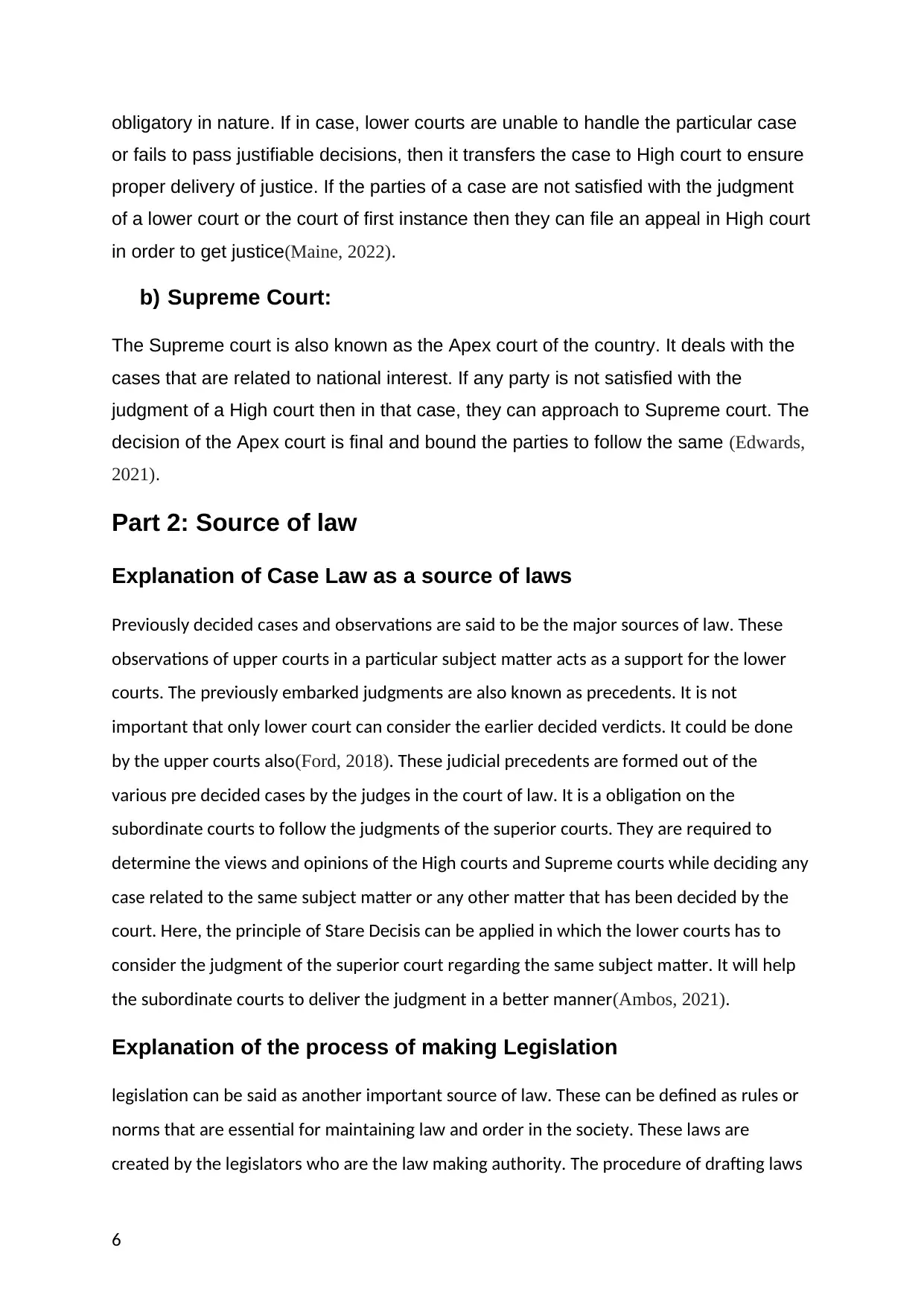
obligatory in nature. If in case, lower courts are unable to handle the particular case
or fails to pass justifiable decisions, then it transfers the case to High court to ensure
proper delivery of justice. If the parties of a case are not satisfied with the judgment
of a lower court or the court of first instance then they can file an appeal in High court
in order to get justice(Maine, 2022).
b) Supreme Court:
The Supreme court is also known as the Apex court of the country. It deals with the
cases that are related to national interest. If any party is not satisfied with the
judgment of a High court then in that case, they can approach to Supreme court. The
decision of the Apex court is final and bound the parties to follow the same (Edwards,
2021).
Part 2: Source of law
Explanation of Case Law as a source of laws
Previously decided cases and observations are said to be the major sources of law. These
observations of upper courts in a particular subject matter acts as a support for the lower
courts. The previously embarked judgments are also known as precedents. It is not
important that only lower court can consider the earlier decided verdicts. It could be done
by the upper courts also(Ford, 2018). These judicial precedents are formed out of the
various pre decided cases by the judges in the court of law. It is a obligation on the
subordinate courts to follow the judgments of the superior courts. They are required to
determine the views and opinions of the High courts and Supreme courts while deciding any
case related to the same subject matter or any other matter that has been decided by the
court. Here, the principle of Stare Decisis can be applied in which the lower courts has to
consider the judgment of the superior court regarding the same subject matter. It will help
the subordinate courts to deliver the judgment in a better manner(Ambos, 2021).
Explanation of the process of making Legislation
legislation can be said as another important source of law. These can be defined as rules or
norms that are essential for maintaining law and order in the society. These laws are
created by the legislators who are the law making authority. The procedure of drafting laws
6
or fails to pass justifiable decisions, then it transfers the case to High court to ensure
proper delivery of justice. If the parties of a case are not satisfied with the judgment
of a lower court or the court of first instance then they can file an appeal in High court
in order to get justice(Maine, 2022).
b) Supreme Court:
The Supreme court is also known as the Apex court of the country. It deals with the
cases that are related to national interest. If any party is not satisfied with the
judgment of a High court then in that case, they can approach to Supreme court. The
decision of the Apex court is final and bound the parties to follow the same (Edwards,
2021).
Part 2: Source of law
Explanation of Case Law as a source of laws
Previously decided cases and observations are said to be the major sources of law. These
observations of upper courts in a particular subject matter acts as a support for the lower
courts. The previously embarked judgments are also known as precedents. It is not
important that only lower court can consider the earlier decided verdicts. It could be done
by the upper courts also(Ford, 2018). These judicial precedents are formed out of the
various pre decided cases by the judges in the court of law. It is a obligation on the
subordinate courts to follow the judgments of the superior courts. They are required to
determine the views and opinions of the High courts and Supreme courts while deciding any
case related to the same subject matter or any other matter that has been decided by the
court. Here, the principle of Stare Decisis can be applied in which the lower courts has to
consider the judgment of the superior court regarding the same subject matter. It will help
the subordinate courts to deliver the judgment in a better manner(Ambos, 2021).
Explanation of the process of making Legislation
legislation can be said as another important source of law. These can be defined as rules or
norms that are essential for maintaining law and order in the society. These laws are
created by the legislators who are the law making authority. The procedure of drafting laws
6
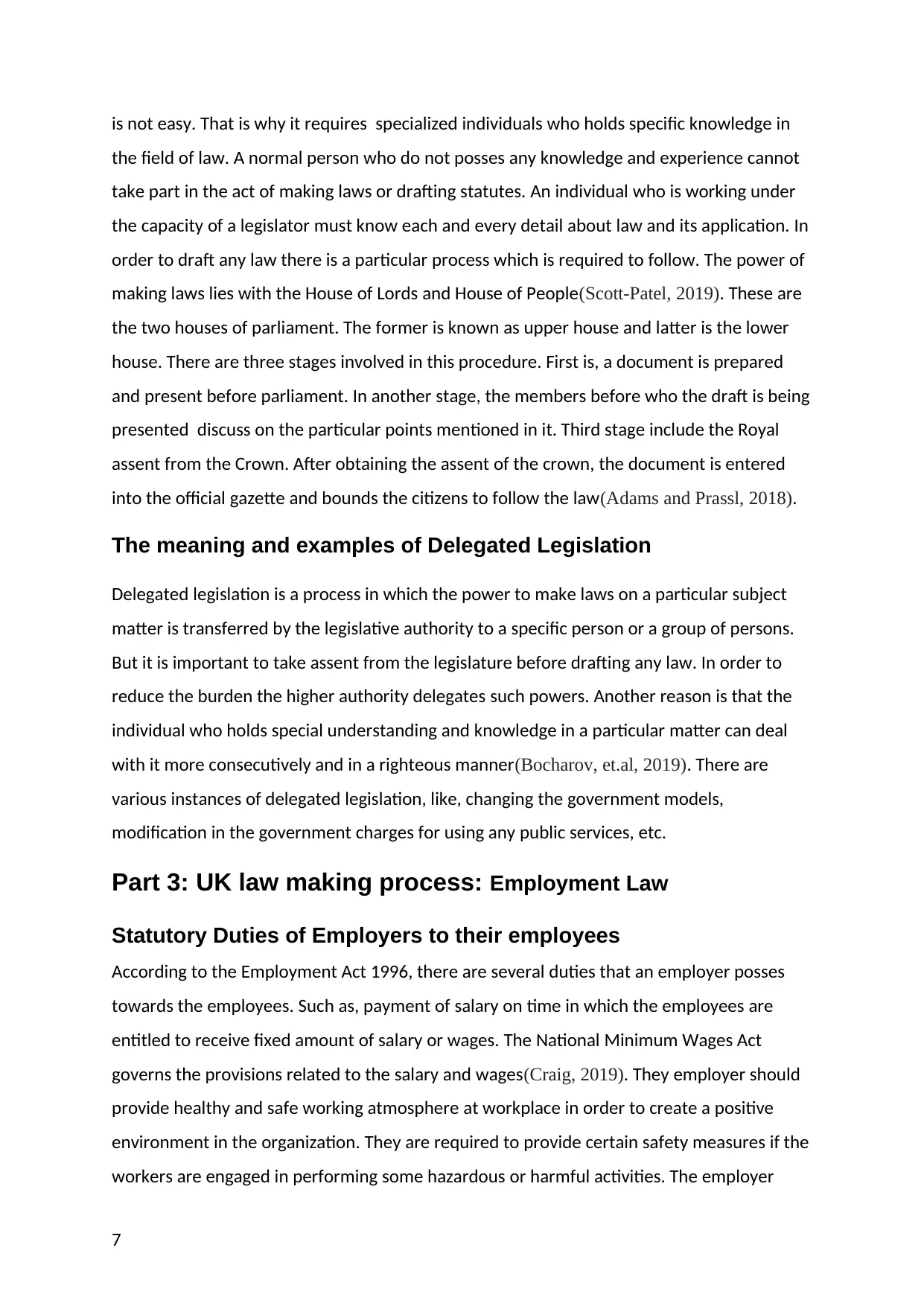
is not easy. That is why it requires specialized individuals who holds specific knowledge in
the field of law. A normal person who do not posses any knowledge and experience cannot
take part in the act of making laws or drafting statutes. An individual who is working under
the capacity of a legislator must know each and every detail about law and its application. In
order to draft any law there is a particular process which is required to follow. The power of
making laws lies with the House of Lords and House of People(Scott-Patel, 2019). These are
the two houses of parliament. The former is known as upper house and latter is the lower
house. There are three stages involved in this procedure. First is, a document is prepared
and present before parliament. In another stage, the members before who the draft is being
presented discuss on the particular points mentioned in it. Third stage include the Royal
assent from the Crown. After obtaining the assent of the crown, the document is entered
into the official gazette and bounds the citizens to follow the law(Adams and Prassl, 2018).
The meaning and examples of Delegated Legislation
Delegated legislation is a process in which the power to make laws on a particular subject
matter is transferred by the legislative authority to a specific person or a group of persons.
But it is important to take assent from the legislature before drafting any law. In order to
reduce the burden the higher authority delegates such powers. Another reason is that the
individual who holds special understanding and knowledge in a particular matter can deal
with it more consecutively and in a righteous manner(Bocharov, et.al, 2019). There are
various instances of delegated legislation, like, changing the government models,
modification in the government charges for using any public services, etc.
Part 3: UK law making process: Employment Law
Statutory Duties of Employers to their employees
According to the Employment Act 1996, there are several duties that an employer posses
towards the employees. Such as, payment of salary on time in which the employees are
entitled to receive fixed amount of salary or wages. The National Minimum Wages Act
governs the provisions related to the salary and wages(Craig, 2019). They employer should
provide healthy and safe working atmosphere at workplace in order to create a positive
environment in the organization. They are required to provide certain safety measures if the
workers are engaged in performing some hazardous or harmful activities. The employer
7
the field of law. A normal person who do not posses any knowledge and experience cannot
take part in the act of making laws or drafting statutes. An individual who is working under
the capacity of a legislator must know each and every detail about law and its application. In
order to draft any law there is a particular process which is required to follow. The power of
making laws lies with the House of Lords and House of People(Scott-Patel, 2019). These are
the two houses of parliament. The former is known as upper house and latter is the lower
house. There are three stages involved in this procedure. First is, a document is prepared
and present before parliament. In another stage, the members before who the draft is being
presented discuss on the particular points mentioned in it. Third stage include the Royal
assent from the Crown. After obtaining the assent of the crown, the document is entered
into the official gazette and bounds the citizens to follow the law(Adams and Prassl, 2018).
The meaning and examples of Delegated Legislation
Delegated legislation is a process in which the power to make laws on a particular subject
matter is transferred by the legislative authority to a specific person or a group of persons.
But it is important to take assent from the legislature before drafting any law. In order to
reduce the burden the higher authority delegates such powers. Another reason is that the
individual who holds special understanding and knowledge in a particular matter can deal
with it more consecutively and in a righteous manner(Bocharov, et.al, 2019). There are
various instances of delegated legislation, like, changing the government models,
modification in the government charges for using any public services, etc.
Part 3: UK law making process: Employment Law
Statutory Duties of Employers to their employees
According to the Employment Act 1996, there are several duties that an employer posses
towards the employees. Such as, payment of salary on time in which the employees are
entitled to receive fixed amount of salary or wages. The National Minimum Wages Act
governs the provisions related to the salary and wages(Craig, 2019). They employer should
provide healthy and safe working atmosphere at workplace in order to create a positive
environment in the organization. They are required to provide certain safety measures if the
workers are engaged in performing some hazardous or harmful activities. The employer
7
Paraphrase This Document
Need a fresh take? Get an instant paraphrase of this document with our AI Paraphraser
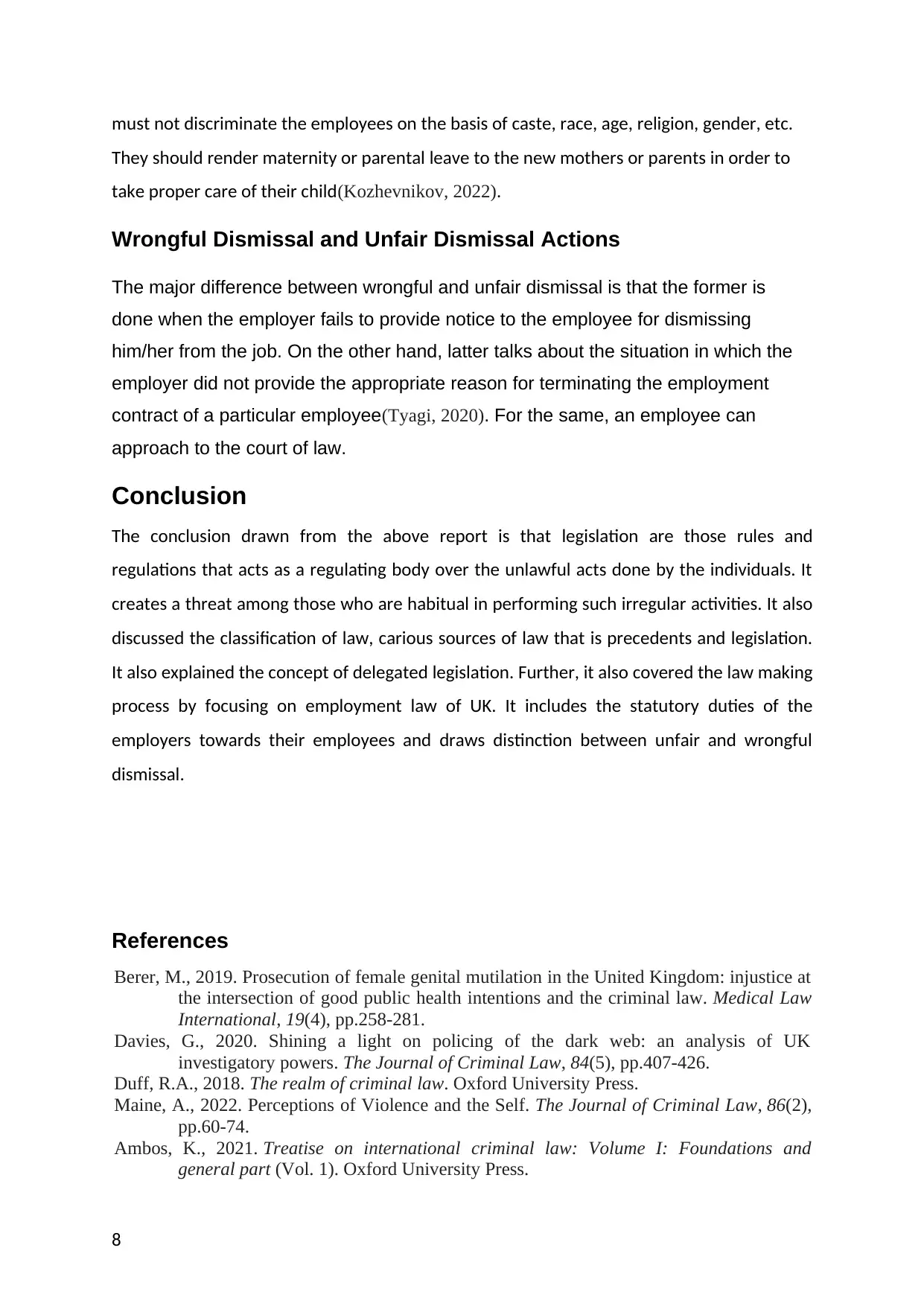
must not discriminate the employees on the basis of caste, race, age, religion, gender, etc.
They should render maternity or parental leave to the new mothers or parents in order to
take proper care of their child(Kozhevnikov, 2022).
Wrongful Dismissal and Unfair Dismissal Actions
The major difference between wrongful and unfair dismissal is that the former is
done when the employer fails to provide notice to the employee for dismissing
him/her from the job. On the other hand, latter talks about the situation in which the
employer did not provide the appropriate reason for terminating the employment
contract of a particular employee(Tyagi, 2020). For the same, an employee can
approach to the court of law.
Conclusion
The conclusion drawn from the above report is that legislation are those rules and
regulations that acts as a regulating body over the unlawful acts done by the individuals. It
creates a threat among those who are habitual in performing such irregular activities. It also
discussed the classification of law, carious sources of law that is precedents and legislation.
It also explained the concept of delegated legislation. Further, it also covered the law making
process by focusing on employment law of UK. It includes the statutory duties of the
employers towards their employees and draws distinction between unfair and wrongful
dismissal.
References
Berer, M., 2019. Prosecution of female genital mutilation in the United Kingdom: injustice at
the intersection of good public health intentions and the criminal law. Medical Law
International, 19(4), pp.258-281.
Davies, G., 2020. Shining a light on policing of the dark web: an analysis of UK
investigatory powers. The Journal of Criminal Law, 84(5), pp.407-426.
Duff, R.A., 2018. The realm of criminal law. Oxford University Press.
Maine, A., 2022. Perceptions of Violence and the Self. The Journal of Criminal Law, 86(2),
pp.60-74.
Ambos, K., 2021. Treatise on international criminal law: Volume I: Foundations and
general part (Vol. 1). Oxford University Press.
8
They should render maternity or parental leave to the new mothers or parents in order to
take proper care of their child(Kozhevnikov, 2022).
Wrongful Dismissal and Unfair Dismissal Actions
The major difference between wrongful and unfair dismissal is that the former is
done when the employer fails to provide notice to the employee for dismissing
him/her from the job. On the other hand, latter talks about the situation in which the
employer did not provide the appropriate reason for terminating the employment
contract of a particular employee(Tyagi, 2020). For the same, an employee can
approach to the court of law.
Conclusion
The conclusion drawn from the above report is that legislation are those rules and
regulations that acts as a regulating body over the unlawful acts done by the individuals. It
creates a threat among those who are habitual in performing such irregular activities. It also
discussed the classification of law, carious sources of law that is precedents and legislation.
It also explained the concept of delegated legislation. Further, it also covered the law making
process by focusing on employment law of UK. It includes the statutory duties of the
employers towards their employees and draws distinction between unfair and wrongful
dismissal.
References
Berer, M., 2019. Prosecution of female genital mutilation in the United Kingdom: injustice at
the intersection of good public health intentions and the criminal law. Medical Law
International, 19(4), pp.258-281.
Davies, G., 2020. Shining a light on policing of the dark web: an analysis of UK
investigatory powers. The Journal of Criminal Law, 84(5), pp.407-426.
Duff, R.A., 2018. The realm of criminal law. Oxford University Press.
Maine, A., 2022. Perceptions of Violence and the Self. The Journal of Criminal Law, 86(2),
pp.60-74.
Ambos, K., 2021. Treatise on international criminal law: Volume I: Foundations and
general part (Vol. 1). Oxford University Press.
8
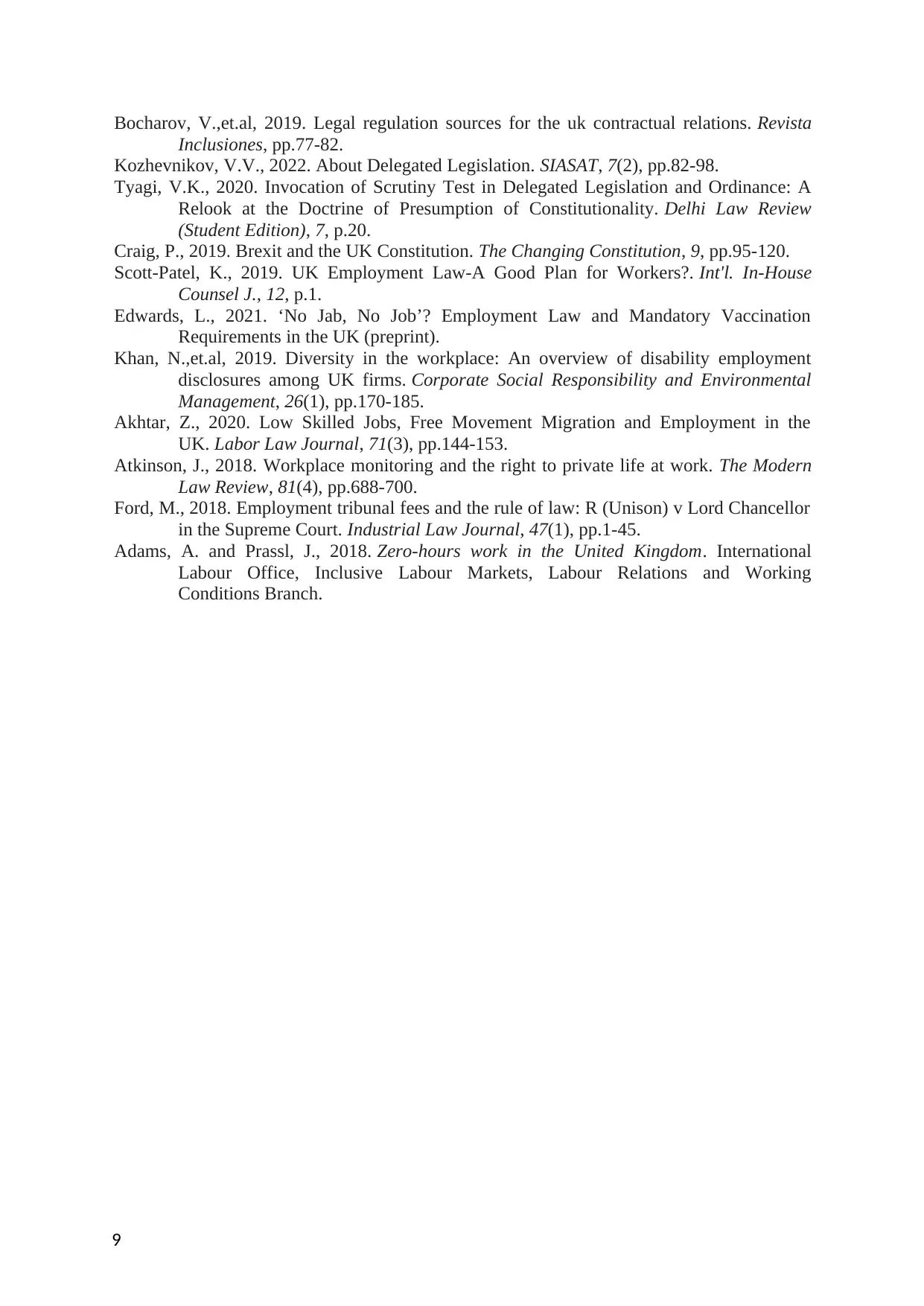
Bocharov, V.,et.al, 2019. Legal regulation sources for the uk contractual relations. Revista
Inclusiones, pp.77-82.
Kozhevnikov, V.V., 2022. About Delegated Legislation. SIASAT, 7(2), pp.82-98.
Tyagi, V.K., 2020. Invocation of Scrutiny Test in Delegated Legislation and Ordinance: A
Relook at the Doctrine of Presumption of Constitutionality. Delhi Law Review
(Student Edition), 7, p.20.
Craig, P., 2019. Brexit and the UK Constitution. The Changing Constitution, 9, pp.95-120.
Scott-Patel, K., 2019. UK Employment Law-A Good Plan for Workers?. Int'l. In-House
Counsel J., 12, p.1.
Edwards, L., 2021. ‘No Jab, No Job’? Employment Law and Mandatory Vaccination
Requirements in the UK (preprint).
Khan, N.,et.al, 2019. Diversity in the workplace: An overview of disability employment
disclosures among UK firms. Corporate Social Responsibility and Environmental
Management, 26(1), pp.170-185.
Akhtar, Z., 2020. Low Skilled Jobs, Free Movement Migration and Employment in the
UK. Labor Law Journal, 71(3), pp.144-153.
Atkinson, J., 2018. Workplace monitoring and the right to private life at work. The Modern
Law Review, 81(4), pp.688-700.
Ford, M., 2018. Employment tribunal fees and the rule of law: R (Unison) v Lord Chancellor
in the Supreme Court. Industrial Law Journal, 47(1), pp.1-45.
Adams, A. and Prassl, J., 2018. Zero-hours work in the United Kingdom. International
Labour Office, Inclusive Labour Markets, Labour Relations and Working
Conditions Branch.
9
Inclusiones, pp.77-82.
Kozhevnikov, V.V., 2022. About Delegated Legislation. SIASAT, 7(2), pp.82-98.
Tyagi, V.K., 2020. Invocation of Scrutiny Test in Delegated Legislation and Ordinance: A
Relook at the Doctrine of Presumption of Constitutionality. Delhi Law Review
(Student Edition), 7, p.20.
Craig, P., 2019. Brexit and the UK Constitution. The Changing Constitution, 9, pp.95-120.
Scott-Patel, K., 2019. UK Employment Law-A Good Plan for Workers?. Int'l. In-House
Counsel J., 12, p.1.
Edwards, L., 2021. ‘No Jab, No Job’? Employment Law and Mandatory Vaccination
Requirements in the UK (preprint).
Khan, N.,et.al, 2019. Diversity in the workplace: An overview of disability employment
disclosures among UK firms. Corporate Social Responsibility and Environmental
Management, 26(1), pp.170-185.
Akhtar, Z., 2020. Low Skilled Jobs, Free Movement Migration and Employment in the
UK. Labor Law Journal, 71(3), pp.144-153.
Atkinson, J., 2018. Workplace monitoring and the right to private life at work. The Modern
Law Review, 81(4), pp.688-700.
Ford, M., 2018. Employment tribunal fees and the rule of law: R (Unison) v Lord Chancellor
in the Supreme Court. Industrial Law Journal, 47(1), pp.1-45.
Adams, A. and Prassl, J., 2018. Zero-hours work in the United Kingdom. International
Labour Office, Inclusive Labour Markets, Labour Relations and Working
Conditions Branch.
9
1 out of 9
Related Documents
Your All-in-One AI-Powered Toolkit for Academic Success.
+13062052269
info@desklib.com
Available 24*7 on WhatsApp / Email
![[object Object]](/_next/static/media/star-bottom.7253800d.svg)
Unlock your academic potential
© 2024 | Zucol Services PVT LTD | All rights reserved.

